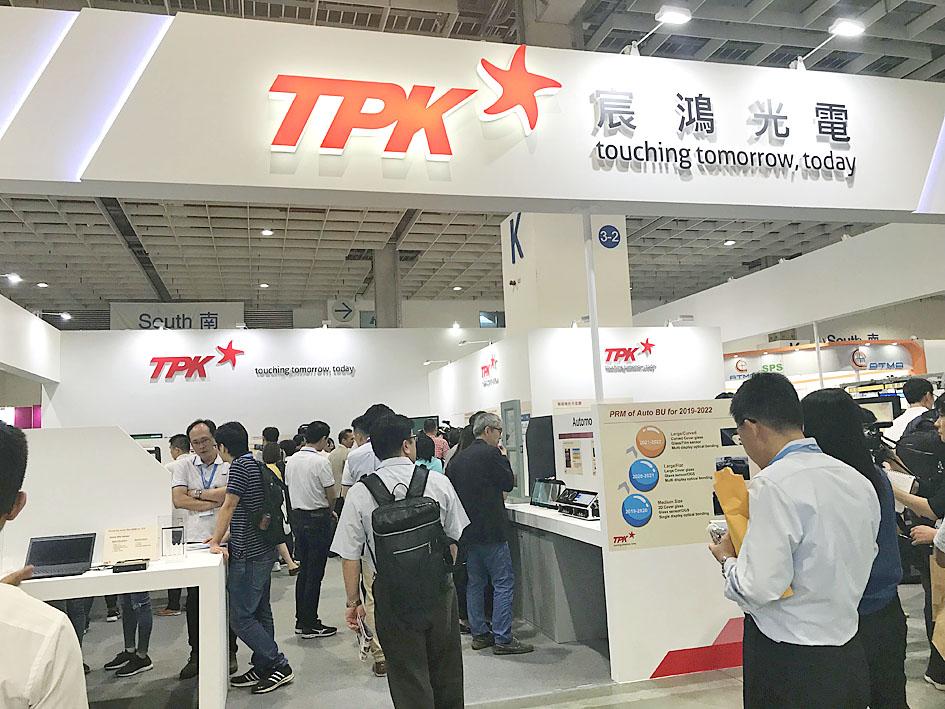Touch module supplier TPK Holding Co (宸鴻) yesterday reported that net profit dipped 51 percent annually last quarter to its lowest in two years, as demand slumped from key smartphone clients and component shortages constrained shipments.
Net income fell to NT$118 million (US$4.21 million) last quarter, compared with NT$241 million in the fourth quarter of 2020. That represents a quarterly decline of 58 percent from NT$279 million.
TPK sank to an operating loss of NT$88 million, the largest since the fourth quarter of 2019.

Photo: Chen Mei-ying, Taipei Times
Gross margin dropped to 3.8 percent, from 4.8 percent a year earlier and 4.6 percent a quarter earlier.
“Our output has fallen since the industry entered the slow season in November,” TPK chief strategy officer Freddie Liu (劉詩亮) told investors on a videoconference.
“Some older smartphone models, which are equipped with our touch panels, are approaching the end of product cycle, leading to a decline in our factory utilization,” he said.
“We have not received orders for new smartphone models from one client in two years,” he added.
TPK managed to mitigate a significant decline in smartphone touch panel shipments by expanding to notebook computer and tablet segments, which together made up about 70 percent of TPK’s shipments last year, Liu said.
TPK saw net profit last year grow 3.6 percent to NT$1.07 billion, compared with NT$1.03 billion in 2020. Earnings per share rose to NT$2.63 from NT$2.53.
The company said it expects a quarterly reduction of 5 to 10 percent in revenue this quarter, based on its financial performance in the first quarters over the past few years.
“The visibility is hazy, now that the Russia-Ukraine conflict has increased uncertainty,” Liu said. “We are not sure how the supply chain and end market demand will be affected by such a political and economic situation.”
Nevertheless, TPK said it expects the tight supply of key components and port gridlock to improve next quarter.
Regarding when the company’s unique silver nanowire touch module technology would be used in foldable phones, TPK CEO Leo Hsieh (謝立群) said that “there will be slim chance to see that happen this year.”
Clients are facing challenges in developing displays, mechanical parts and cover glasses suitable for foldable phones, he said.
To fuel revenue growth, TPK is concentrating on expanding its liquid-crystal module (LCM) business, which integrates its touch sensor into LCD panels.
Hsieh said that TPK might expand LCM capacity this year to cope with rising customer demand, after quadrupling capacity last year.
TPK plans to spend NT$1.3 billion this year, compared with NT$790 million last year.

CHIP RACE: Three years of overbroad export controls drove foreign competitors to pursue their own AI chips, and ‘cost US taxpayers billions of dollars,’ Nvidia said China has figured out the US strategy for allowing it to buy Nvidia Corp’s H200s and is rejecting the artificial intelligence (AI) chip in favor of domestically developed semiconductors, White House AI adviser David Sacks said, citing news reports. US President Donald Trump on Monday said that he would allow shipments of Nvidia’s H200 chips to China, part of an administration effort backed by Sacks to challenge Chinese tech champions such as Huawei Technologies Co (華為) by bringing US competition to their home market. On Friday, Sacks signaled that he was uncertain about whether that approach would work. “They’re rejecting our chips,” Sacks

NATIONAL SECURITY: Intel’s testing of ACM tools despite US government control ‘highlights egregious gaps in US technology protection policies,’ a former official said Chipmaker Intel Corp has tested chipmaking tools this year from a toolmaker with deep roots in China and two overseas units that were targeted by US sanctions, according to two sources with direct knowledge of the matter. Intel, which fended off calls for its CEO’s resignation from US President Donald Trump in August over his alleged ties to China, got the tools from ACM Research Inc, a Fremont, California-based producer of chipmaking equipment. Two of ACM’s units, based in Shanghai and South Korea, were among a number of firms barred last year from receiving US technology over claims they have

It is challenging to build infrastructure in much of Europe. Constrained budgets and polarized politics tend to undermine long-term projects, forcing officials to react to emergencies rather than plan for the future. Not in Austria. Today, the country is to officially open its Koralmbahn tunnel, the 5.9 billion euro (US$6.9 billion) centerpiece of a groundbreaking new railway that will eventually run from Poland’s Baltic coast to the Adriatic Sea, transforming travel within Austria and positioning the Alpine nation at the forefront of logistics in Europe. “It is Austria’s biggest socio-economic experiment in over a century,” said Eric Kirschner, an economist at Graz-based Joanneum

OPTION: Uber said it could provide higher pay for batch trips, if incentives for batching is not removed entirely, as the latter would force it to pass on the costs to consumers Uber Technologies Inc yesterday warned that proposed restrictions on batching orders and minimum wages could prompt a NT$20 delivery fee increase in Taiwan, as lower efficiency would drive up costs. Uber CEO Dara Khosrowshahi made the remarks yesterday during his visit to Taiwan. He is on a multileg trip to the region, which includes stops in South Korea and Japan. His visit coincided the release last month of the Ministry of Labor’s draft bill on the delivery sector, which aims to safeguard delivery workers’ rights and improve their welfare. The ministry set the minimum pay for local food delivery drivers at